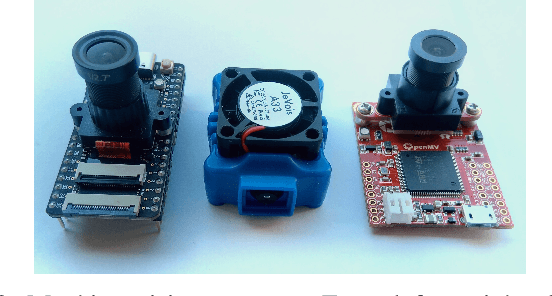Performance Evaluation of Low-Cost Machine Vision Cameras for Image-Based Grasp Verification
Paper and Code
Mar 23, 2020



Grasp verification is advantageous for autonomous manipulation robots as they provide the feedback required for higher level planning components about successful task completion. However, a major obstacle in doing grasp verification is sensor selection. In this paper, we propose a vision based grasp verification system using machine vision cameras, with the verification problem formulated as an image classification task. Machine vision cameras consist of a camera and a processing unit capable of on-board deep learning inference. The inference in these low-power hardware are done near the data source, reducing the robot's dependence on a centralized server, leading to reduced latency, and improved reliability. Machine vision cameras provide the deep learning inference capabilities using different neural accelerators. Although, it is not clear from the documentation of these cameras what is the effect of these neural accelerators on performance metrics such as latency and throughput. To systematically benchmark these machine vision cameras, we propose a parameterized model generator that generates end to end models of Convolutional Neural Networks(CNN). Using these generated models we benchmark latency and throughput of two machine vision cameras, JeVois A33 and Sipeed Maix Bit. Our experiments demonstrate that the selected machine vision camera and the deep learning models can robustly verify grasp with 97% per frame accuracy.
 Add to Chrome
Add to Chrome Add to Firefox
Add to Firefox Add to Edge
Add to Edge